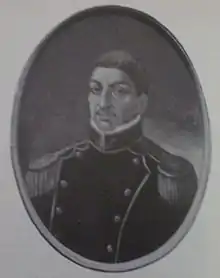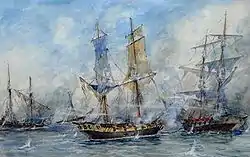Juan Bautista Azopardo
Juan Bautista Azopardo (19 February 1772 in Senglea, Malta – 23 October 1848 in Buenos Aires) was a Maltese privateer and military man who fought under the flags of the Netherlands, Spain and Argentina.
Juan Bautista Azopardo | |
|---|---|
 Juan Bautista Azopardo, Naval Museum - Tigre | |
| Born | 19 February 1772 Senglea, Malta |
| Died | 23 October 1848 (aged 76) Buenos Aires |
| Allegiance | |
| Service/ | Argentine Navy |
| Years of service | 1804 - 1827 |
| Rank | Colonel |
| Battles/wars | British invasions of the Río de la Plata, Argentine War of Independence, Cisplatine War |
Early life
Juan Bautista Azopardo was born in Senglea, Malta, the son of Rosina (née Romano) and Salvatore Azopardo.[1] As a young man he studied naval architecture at the French arsenal in Toulon.
Privateer
He then served with the French and the British fleets, the latter under the command of Admiral John Jervis. He captained the tartanes San Antonio e Anime del Porgatorio.[1] He later served as a privateer with a Letter of marque from the Netherlands, and later with a Letter of marque from Spain against England.
Azopardo arrived in the Río de La Plata area in the first years of the 19th century.
During the war between England and the Batavian Republic (the Netherlands), he served on the schooner The Hoop and took part in the capture of the British frigate HMS Neptune which had arrived at the port of Montevideo as a prize on 21 January 1804. It carried 256 slaves. The prize Captain was the Frenchman Hipólite Mordeille. Azopardo served as second in command of the privateer frigate Dromedario with a Letter of marque from Montevideo, captained by Mordeille.
British Invasions of Buenos Aires (1806 - 1807)
The frigate Dromedario transported some of the troops which fought against the first British Invasion (1806) of Buenos Aires. Along with his captain and the rest of the Dromedario crew, they fought in the final assault to the Brisith fortress in Buenos Aires where the remnants of the British forces under general Beresford were.[2] During the second British invasion (1807) of Buenos Aires they transported artillery pieces on the Paraná River for the city's defense. For his valor and gallantry, the Spanish Royal government made him a Lieutenant Colonel of the urban Militias.
On 17 November 1807, in Buenos Aires, Santiago de Liniers gives him a Letter of marque for his schooner La Mosca, built by Anselmo Saénz Valiente. The Letter of marque expired in 1808 whereupon Azopardo retired from the privateering business.
Argentine service
War of independence
Azopardo joined the revolutionary forces on the May Revolution of 1810. He was given back the rank the Spanish viceroy had taken from him.
After the poor results of the Paraguay campaign, Manuel Belgrano requested reinforcements from Buenos Aires in order to maintain his fight in the region. The Junta could not send them by land through Entre Ríos Province, as the rivers were controlled by the royalist navy under Gaspar de Vigodet. At the end of 1810 the government gave Lieutenant Colonel Azopardo, command of the first national navy, comprising three vessels, whose mission was to protect the advance of the reinforcements to Belgrano's force. The ships of this small squadron were the schooner Invencible, the brigantine 25 de Mayo and the sloop América. His second in command was captain Hipólito Bouchard.

At the Battle of San Nicolás, on 2 March 1811, he was forced to confront a superior royalist navy with seven ships to his three. Azopardo was wounded and made prisoner, with his ships being captured. Belgrano would have to do without reinforcements and be forced to sign a document abandoning Paraguay.
Imprisoned by the Spaniards, he was moved to Ceuta, where he shared a prison cell with the Inca Juan Bautista Túpac Amaru. The revolution of General Riego (1820) ended with the liberals taking power in Spain, and ordering the freedom of all political prisoners. Azopardo was freed and returned to Argentina where he was received as a hero. He was given the post of Buenos Aires Harbor Master.[1]
War with Brazil
Returning to Buenos Aires he was given command of the brigantine General Belgrano, as second in command to admiral Guillermo Brown, to fight against the naval forces of Pedro I of Brazil who had declared war on Argentina at the end of 1825.
Final service
He returned to the post of Buenos Aires Harbor Master until 1826. On 3 February 1827 he requested and obtained his retirement.
Last years
He spent his last years with his wife Maria Sandalia Perez Rico and his son Luis Alberto. Juan Bautista Azopardo died on 23 October 1848 in Buenos Aires.
Legacy and honors


Azopardo Monument
In the city of San Nicolás de los Arroyos, an obelisk with a height of 26 metres (85 ft), covered in marble, was made with federal funds to pay homage to the Naval Battle of San Nicolás. Azopardo's remains are buried there.
Other memorials
- in Argentina
- Several vessels of the Argentine Navy and Argentine Coast Guard carried his name: Transport / Tug Boat (1884), Tug Boat (1923), Frigate (1955), Coast Guard Cutter (1962), Coast Guard Cutter GC-25 (1983).
- A naval base ((in Spanish) Arsenal Naval Azopardo) in Azul, Buenos Aires province, is named after him.[3]
- A street in Buenos Aires is named after him.
- Several schools in Argentina are named Azopardo.
- Azopardo Point, in Santa Cruz Province, Argentina.
- Azopardo Lighthouse, in Azopardo Point, Santa Cruz, Argentina.
- Azopardo Rock, in Chubut Province, Argentina.
- in Malta
See also
References
- Senglea Council. "Senglea". Retrieved 27 July 2010.
- Los marinos en las invasiones inglesas, by Laurio Hedelvio Destéfani. Pag 373
- "Aniversario del Arsenal Naval Azopardo". Diario El Tiempo de Azul. 9 January 2015. Archived from the original on 4 March 2016. Retrieved 18 December 2016.
Further reading
- Azopardo, Mercedes G. (1963). "Coronel de Marina Juan Bautista Azopardo". In Piccirilli, Ricardo; Gianello, Leoncio (eds.). Biografías Navales Argentinas. Secretaría de Estado de Marina.
'The Gallant officer - turned rebel' Part 1, Denis A Darmanin, The Malta Independent on Sunday, 20 October 1995. 'A Valliant son of Malta' Part 2, Denis A Darmanin, The Malta Independent on Sunday, 27 October 1995.